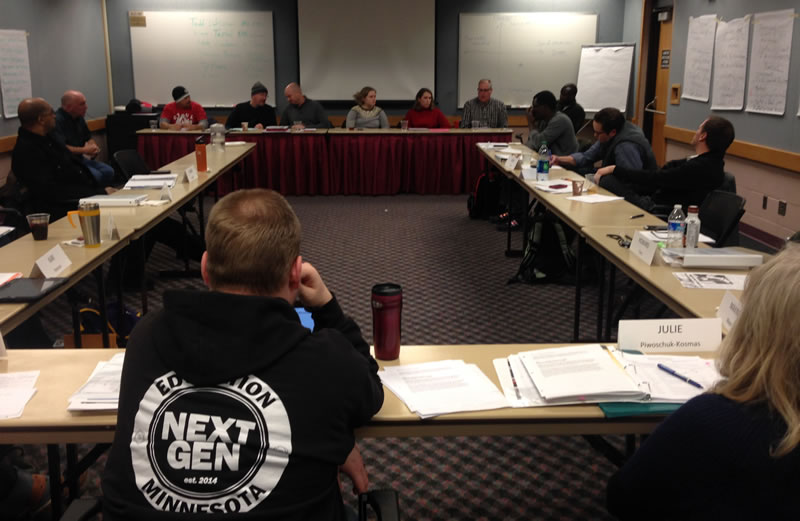

Share
Airport workers mobilizing for a $15-an-hour minimum wage. Teachers seeking to improve the learning environment in their classrooms. Employees pressuring Walmart to improve conditions. Home health care workers forming a union.
All these efforts – and more – depend heavily on building effective political and community coalitions. Organizers from these campaigns and others participated in a panel Jan. 15 as part of the Minnesota Union Leadership Program.
MULP, a program of the University of Minnesota Labor Education Service, provides an in-depth learning experience for emerging and experienced leaders and activists. Learn more about MULP here.
During the Jan. 15 session, focused on “Labor and Social Change,” students examined social movement unionism and historical examples of how workers and social movements can build power. They also discussed best practices for working across movements and building effective coalitions.
“Coalition building is the key. We are all so interconnected,” said Todd Dahlstrom, organizing/growth director for the Minnesota AFL-CIO.
At Minneapolis-St. Paul International Airport, for example, organizing is taking both traditional and nontraditional forms. Delta Air Lines flight attendants recently announced a drive to join the Machinists Union, while other airport workers are calling on the Metropolitan Airports Commission to institute a $15-an-hour minimum wage for contractors at the airport.
Last month, the MAC agreed to institute a paid sick leave requirement for contractors.
Last year, the St. Paul Federation of Teachers won a contract that reduced class sizes, provided more support for new teachers and empowered educators to put innovative ideas into practice. Teachers sought to make the community’s voice heard at the bargaining table, joining with parents and others to identify issues and proposals aimed at improving access and equity in the schools.
Leah Lindeman, an organizer for the federation, explained how the union produced a report, “The Schools Saint Paul Students Deserve,” that became the basis for community conversations. The local also had a member-leader whose entire job involved meeting with parents and organizing in the community.
“It was a lot of leg work. It was that basic knocking on doors, making phone calls,” she said.
Collaboration with others also was critical in the successful effort by 27,000 home health care workers to organize with SEIU Healthcare Minnesota, said Yankuba Fadera, a member of the union’s Executive Board.
“It’s partnering with other organizations and the community,” he noted. Earlier this month, the union and the State of Minnesota reached agreement on a first contract.
Much of today’s organizing is taking place outside the traditional collective bargaining framework, by people joining together through worker centers or groups focused on a specific industry, such as fast food. The panelists agreed this form of organizing will continue to grow in importance.
Diana Tastad, an organizer with OUR Walmart, described why people should care about raising standards at the giant retailer.
“They control retail in every aspect – where we get our goods, who is shipping those goods and also they’ve gotten so powerful . . .” she said. “They’re using their economic clout to exert political pressure on issues like education and health care.”
CTUL, Centro de Trabajadores Unidos en Lucha/The Center of Workers United in Struggle, is the highest-profile worker center in the Twin Cities. CTUL has won a number of victories in its efforts to improve conditions for the workers who clean Target and other retail stores.
“We can start with a small group of workers who can stand up and fight and start winning changes,” said Elmer Santa Cruz, a CTUL organizer.
Ty Moore, an organizer with the 15Now movement working for a $15-an-hour minimum wage at the airport, said the labor movement must learn from its history. Unions were most successful, he said, when they joined in broad movements for economic and social justice.
“It ‘s going to take a serious struggle from below and it’s going to take labor thinking in a different way,” Moore told the MULP students.

